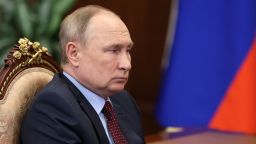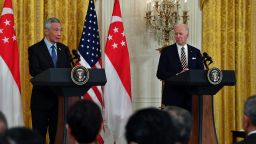A delegation of Ukrainian lawmakers visiting Washington, DC, on Wednesday said they believe Russia is just using peace talks with Ukraine as a “smokescreen” for their forces to regroup and re-strategize in Ukraine.
“At this particular moment, these peace negotiations are far from real negotiations,” Ivanna Klympush-Tsintsadze, who chairs Ukraine’s Parliamentary Committee on Integration of Ukraine to the European Union, told a small group of reporters at a roundtable hosted by the German Marshall Fund think tank.
“Definitely, I think that Putin is using this as a smokescreen, buying time to regroup … and sending false, lying messages to the whole world,” she said.
“We feel these are not real peace talks at this point,” said MP Anastasia Radina, who heads the parliament’s Committee on Anti-Corruption Policy. “We feel that what Russia is doing is trying to save face. They say they are withdrawing troops from Kiev region. That’s not true for one simple reason. They’re not withdrawing. … They were kicked (out).”
Radina said there is only “one way out of the war, and that is for Ukraine to win.”
Their remarks came one day after the Russian Ministry of Defense said that it had decided to “drastically reduce hostilities” around Kyiv and Chernihiv. US officials, including President Joe Biden, remain skeptical of the announcement.
“We’ll see,” Biden said on Tuesday when asked about Russia’s claims. “I don’t read anything into it until I see what their actions are. We’ll see if they follow through on what they’re suggesting.”
More weapons needed: Ukraine’s military is seeking foreign assistance obtaining reconnaissance and attack drones, tactical radars, electronic warfare anti-drone systems and close-air support aircraft, according to Ukraine’s most recent list of needs provided to Congress.
The list delivered to Capitol Hill on Tuesday, which was obtained by CNN, also includes help treating wounded troops and repairing equipment, including mobile military medical hospitals, the repairs of armored vehicles in neighboring countries and aircraft to help transport weapons.
Rep. Jason Crow, a Colorado Democrat, said at a House Armed Services Committee hearing on Wednesday that latest the list provided to Congress this week reflected Ukrainian military and civilian leadership’s “urgent needs.” At the top of the priority list of 17 items was reconnaissance and attack drones, including “switchblade” drones, which are small so-called kamikaze or suicide drones that carry a warhead and detonate on impact.
The list also included combat aircraft — specifically referencing the Su-25, a Russian-made ground attack plane similar to the US-made A-10 Warthog. The Ukrainian military is also seeking artillery systems, surface-to-air missile systems, anti-tank Javelin missiles, anti-ship missiles and optical surveillance equipment.
The all-female Ukrainian delegation — men between the ages of 18-60 are not allowed to leave Ukraine amid the war — traveled to Washington this week primarily, they say, to ask American lawmakers and administration officials for more military support, which they said is still falling far short of Ukraine’s needs.
“Proper action for Ukraine right now, for support to Ukraine right now, would be weaponry,” Radina said. “Ukraine is constantly asking for weaponry and not only defensive weaponry, but also offensive weaponry. In our situation, this distinction between defensive and offensive is, frankly speaking, humiliating. In our situation, all weapons are defensive because we are defending our lands.”
Radina reiterated that Ukraine needs fighter jets, “because this is how we can actually stop bombings. … And as of now this is the issue on the table, and while it is on the table, people will continue suffering.”
“Our ‘humanitarian aid’ is weapons,” said MP Maria Ionova. “Because to minimize these victims and casualties, we have to defend our air. Freedom has to be armed. And that is why our main message here is please, help us to defend our future and the future of the democratic world.”
“Neutrality is not an option for Ukraine”: Ukrainian President Volodymyr Zelensky has signaled that Ukraine might be willing to forgo NATO membership and commit to neutrality if the West provides Ukraine with solid security guarantees. But such a move would have to be put to a referendum — and Klympush-Tsintsadze indicated that anything short of NATO membership should be rejected.
“Neutrality is not an option for Ukraine,” she said.
Read more here.
















